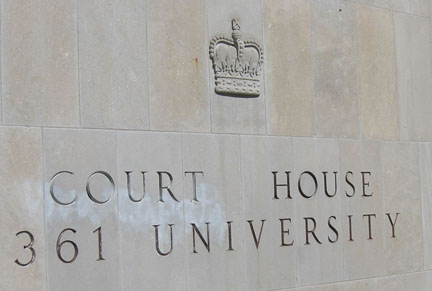A judge who’s calling escalating prices on the court’s time has given the parties in a bankruptcy proceeding just two weeks to file a joint litigation plan after he took over aggressive management of the case.

Ontario Superior Court Justice David Brown made the order in
Atlas Holdings v. Vratsidas last Thursday. It stemmed from the 2007 bankruptcy of Canaclean Building Services Inc., from which Atlas Holdings is seeking $251,000 in outstanding claims. According to the ruling, George Vratsidas and his family allegedly diverted Canaclean customers to a numbered company and later First Maintenance Solutions Ltd. that they had incorporated in the meantime.
But the dispute has since become bogged down in disputes over document production. In June, for example, the court ordered the defendants to provide information about its customers within 10 days of an Ontario Court of Appeal ruling in the case. The appeal court issued written reasons dismissing the appeal on Sept. 6, but First Maintenance and Vratsidas have only partially complied with the court order given their concern that the plaintiff is a competitor, Brown noted. In his ruling last week, Brown, citing the plaintiff’s agreement to restrict access to the documents to its own counsel, said the defendants had breached the court’s order.
In response, Brown threatened to strike Vratsidas’ and First Maintenance’s defences. But instead, he granted the plaintiff access to the materials in question subject to the proposed restrictions. In doing so, he ordered the parties to meet by Dec. 7 in order to come up with a discovery plan, detail any motions they’re considering, address any unpaid costs awards, and come up with a date by which they’ll be ready to set the matter down for trial. At the same time, they must file a joint litigation plan by Dec. 9.
In issuing his ruling, Brown referred to strongly worded comments he has made about civil litigation in the past, including a paper he wrote in May on the sacred cows of the justice system he believes it’s time to do away with. Among his proposals, he would institute pricing for judicial time. In a wrongful dismissal action, for example, parties would have the right to one motion before trial. If they want to bring a second motion, they’d have to pay a higher filing fee. At the same time, he’d introduce incentives to move things along by granting priority in getting hearing dates for parties who agree to follow the rules.
“At the present time, the Superior Court of Justice is operating under conditions of scarcity of judicial resources relative to the demands generated by litigants in the system,” Brown writes in Atlas. “Just as when the price of gasoline increases, those who drive cars think a bit more carefully about how much to use the car and take some care in mapping out more efficient routes to follow when they do drive, so too, if the fees for hearings increase in proportion to the length of hearings, I have no doubt that litigants and their counsel will think more carefully about how to use hearing time.
“Under the present fee structure, they can essentially treat judicial time as free, and we are now witnessing chronic waste and misuse of judicial time by those who use the civil court system.”

 Ontario Superior Court Justice David Brown made the order in Atlas Holdings v. Vratsidas last Thursday. It stemmed from the 2007 bankruptcy of Canaclean Building Services Inc., from which Atlas Holdings is seeking $251,000 in outstanding claims. According to the ruling, George Vratsidas and his family allegedly diverted Canaclean customers to a numbered company and later First Maintenance Solutions Ltd. that they had incorporated in the meantime.
Ontario Superior Court Justice David Brown made the order in Atlas Holdings v. Vratsidas last Thursday. It stemmed from the 2007 bankruptcy of Canaclean Building Services Inc., from which Atlas Holdings is seeking $251,000 in outstanding claims. According to the ruling, George Vratsidas and his family allegedly diverted Canaclean customers to a numbered company and later First Maintenance Solutions Ltd. that they had incorporated in the meantime.